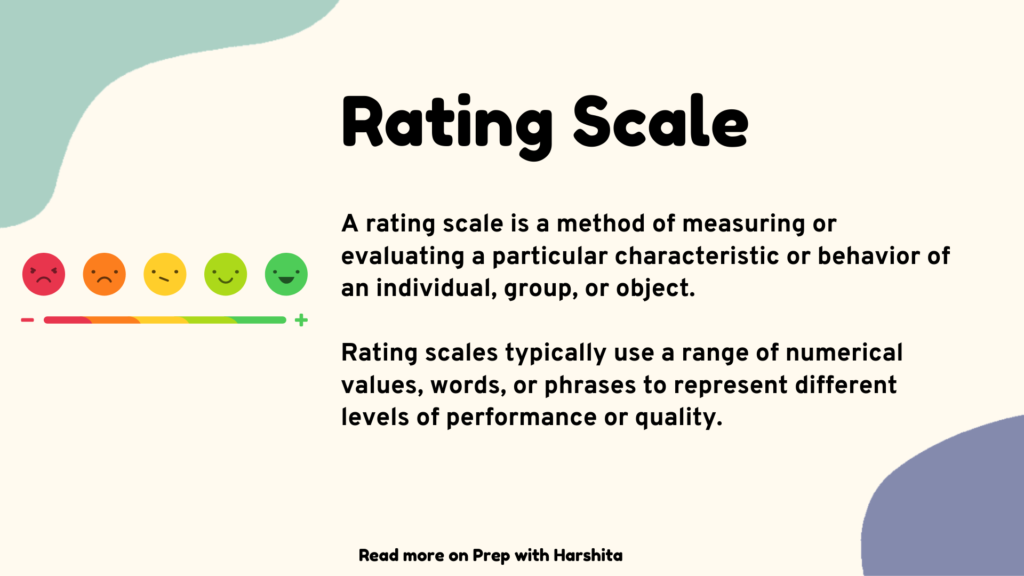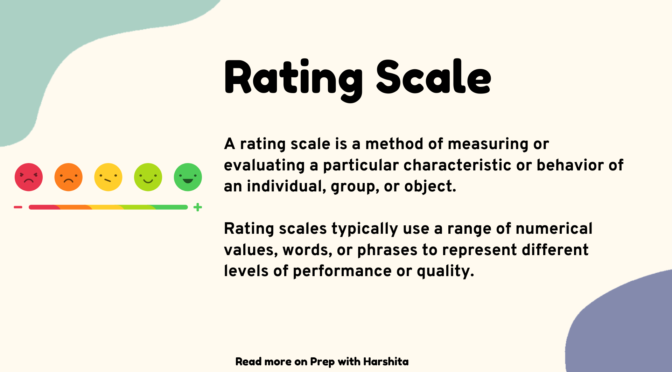A rating scale is a method of measuring or evaluating a particular characteristic or behavior of an individual, group, or object.
Use of Rating Scale
It is a tool that allows people to rate or rank something according to a set of criteria or standards. Rating scales can be used for various purposes, including academic grading, employee performance evaluations, product reviews, and customer satisfaction surveys.
Rating scales typically use a range of numerical values, words, or phrases to represent different levels of performance or quality. For example, a rating scale for a product review might use a scale of 1 to 5, with 1 being the lowest rating and 5 being the highest. A customer could rate the product using this scale, with a rating of 5 indicating that they were highly satisfied with the product, and a rating of 1 indicating that they were highly dissatisfied.
Rating scales can be structured or unstructured. Structured rating scales have specific criteria or descriptions for each rating level. Unstructured rating scales allow the rater to provide their own descriptions or criteria for each level. The choice of rating scale depends on the purpose of the evaluation and the information needed from the evaluation. The rating scale can be customized for performance evaluations or customer satisfaction surveys, to fit the needs of the assessment.
There are several benefits of using a rating scale. Here are some of the key benefits:
- Standardization: Rating scales provide a standardized way of measuring opinions or experiences, which means that they are consistent and comparable across individuals or groups. This is important for ensuring that the data collected is reliable and valid.
- Quantifiability: Rating scales allow subjective opinions to be converted into quantitative data. This means that they can be analyzed statistically, which can help identify trends, patterns, and relationships in the data.
- Ease of use: Rating scales are generally easy to use, understand, and administer. They are often presented as a series of questions or statements that respondents can rate on a numerical scale or with descriptors such as “strongly agree” or “strongly disagree”.
- Flexibility: Rating scales can be used in a variety of contexts, including research, customer feedback, employee surveys, and academic research.
- Cost-effective: Rating scales are generally cost-effective and efficient, as they can be administered to large numbers of people quickly and easily. This makes them a popular choice for research and evaluation projects with limited budgets or tight timelines.
Also Read: Open Ended Questions



Howdy! Do you know if they make any plugins to assist with Search Engine Optimization? I’m trying to get my blog to rank for some targeted keywords but I’m not seeing very good success. If you know of any please share. Appreciate it!
Keep functioning ,impressive job!
I like this weblog so much, saved to fav. “Nostalgia isn’t what it used to be.” by Peter De Vries.
Your style is so unique compared to many other people. Thank you for publishing when you have the opportunity,Guess I will just make this bookmarked.2
Some really nice and useful information on this web site, as well I conceive the layout has got superb features.